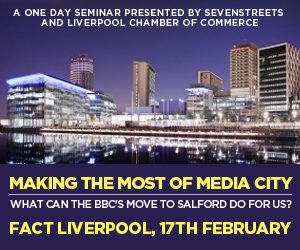Is Radio Merseyside Safe?
This week, the BBC Trust is set to deliver its preliminary findings, following their discussions over the projected cuts to local radio. Are we sensing a victory in the wind? Let's hope so, says David Lloyd.
Last week saw a powerful and persuasive letter printed in the Times. It was signed by Bleasedale, Russell, Mike McCartney and Mal Young (ex head of BBC Drama and, yes, he of Desperate Sousewives. But we’ll gloss over that bit for now).
It came, oddly enough, on the day I switched off Midweek with Libby Purves. I’d suddenly snapped and thought ‘not in my name, Radio 4, not in my name.’ Too much home counties chuntering in the morning for me, I’m afraid, no matter how ‘unique’ a ‘cultural exercise’ the station is according to Director General Mark Thomson, it too often says nothing to me about my life. Roger Phillips, Dave Monks, Snelly and Co? They talk our language. They talk with us.
The letter talked of how Radio Merseyside was the ‘beating heart’ of our region and of how the station was “The nearest you can get to your audience.” It’s something we already know, of course. Merseyside regularly reaches 380,000 listeners a week. Every new set of RAJAR figures confirms the fact: it’s doing exactly what the BBC is chartered, and protected, to do.
Yet, with ten cuts last year, and more projected when the proposed cuts come into force this April, the station has been battening down the hatches, and preparing itself for cuts in ‘scope and productivity’ losses.
“The station gives a platform for people to engage and become part of the community,” Mal Young said. In a way, I’d offer, that Libby and Co simply can’t. Nor do they particularly try. Nor does Melvyn Bragg, with his increasingly bizarre and incomprehensible In Our Time essays. Nor much of the station’s stale and southern-centred output. Just one listen to the US’s NPR shows you how much more gripping, and engaging, speech and factual based radio has the potential to be.
Don’t get me wrong. I love Radio 4, I love Eddie Mair, and Sandy Toksvig and even You and Yours (oh the shame!). But it shouldn’t be given a mandate to be the only voice in a country full of colour, culture and contradiction. And that’s where vibrant, honest local radio, such as Merseyside, has a role that no other media can come close to repeating: the best local radio programming touches us in a way little else comes close to. And, often, it’s a catalyst for country-wide conversation.
The letter went on to say: “Whether in politics or sport, whether in celebration or sometimes crushing defeat, BBC Radio Merseyside has given voice to the beating heart of this community.
“To paraphrase Mark Thompson and the great Bill Shankly, BBC Radio Merseyside is not merely a ‘unique cultural exercise’, it’s much more important than that.
“We hope that the BBC Trust holds this in mind as it makes its deliberations.”
The deliberations were to cut Merseyside’s budget by a swingeing 20%, while, at the same time, ring fencing Radio 4′s. Isn’t, we suggest, Britain already dangerously London-centric? What message does this give out? We all pay an equal part into the BBC pie, whether we’re in Shephard’s Bush or Shetland. We should all, equally, receive a service that reflects our experience. And no, Radio 4 doesn’t do that. Not yet, at least.
Today we learn that, following a series of meetings, the BBC Trust chairman is expected to ask BBC Director General, Mark Thomson, to mitigate £15m cuts that would have led to the loss of 280 jobs.
Last time the Trust met in the swanky new Salford Media City HQ they were ambushed, in the politest possible way, by Radio Merseyside’s action group, headed by passionate advocate for the station - the most listened to local station in the country - Kathleen Keig.
“I am passionate about protecting local radio and feel really strongly that the proposed cuts will affect both quality and diversity,” she tells SevenStreets.
The chairman of the BBC Trust will address the Oxford Media Convention on Wednesday. From here, it’s expected he’ll ask Thomson to have a Radio 6-like rethink, to find other ways to save money rather than crippling the output of essential and unique services such as Merseyside - and to shelve the hideousness that would have been ‘Radio England’ - a single service serving the entire country overnight.
Let’s hope these rumours are true. Local radio speaks our language. The BBC’s stations in England have a collective average weekly audience of 7.25 million listeners, up from 6.96 million a year ago.
How many of us can honestly say the city is truly reflected by Juice FM and CityTalk alone? In an age of trashy stereotypes and desperate scouseploitation we need Radio Merseyside more than ever.
One of the board of BBC trustees, Alison Hastings will be interviewed on BBC Radio Merseyside’s drivetime programme with Simon Hoban tonight (5-7pm). And don’t be surprised if you see Kathleen and the BBC Radio Merseyside supporters’ army outside the station also!
BBC Radio Merseyside

























» Music & Listening » Feature » Is Radio Merseyside Safe?
8